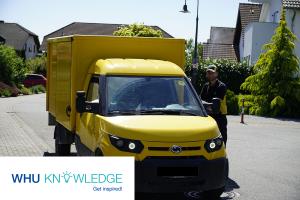
Package stations instead of robots: What package delivery will look like by 2040
Online trade is booming and new solutions for last-mile delivery need to be found. A new study reveals how these challenges are likely to be met by 2040.
VALLENDAR, RHINELAND-PALATINATE, GERMANY, March 3, 2022 /EINPresswire.com/ -- Online trade is booming, not only due to the pandemic, and the number of packages sent every day is steadily rising. The delivery of these shipments can be quite problematic, particularly during the last stage of the journey: last-mile delivery. This stage, where the goods are ultimately delivered to the customer, is expensive and often the most difficult to implement for logistics service providers. A new Delphi study performed at the WHU – Otto Beisheim School of Management reveals how these challenges are likely to be met by 2040.
Online retailers, local governments, and logistics companies alike are all concerned with the future of last-minute delivery and what it should look like. For a recent Delphi study performed at WHU – Otto Beisheim School of Management, experts from various industries assessed the situation and discussed the developments we are most likely to witness in the future. If things continue as they are today, we could be heading for disaster: an ever-increasing amount of delivery trucks congesting city centers, safety problems on the roads and sidewalks, and increased air pollution. With this study, the expert team reveals that this will likely not be our future.
Logistics service companies, as well as the online retailers they work with, will only find success if their customers are satisfied. For this reason, consumer preference is of the utmost importance in the business of package delivery. According to the study, customers in 2040 are likely to value flexibility over all else. They may be more willing to disclose personal information in the pursuit of more custom delivery options that conform to their everyday lives. Given this potential future, it would behoove logistics service providers to start expanding their service options now, thereby giving themselves a way to adapt to their customers’ wishes. Additionally, there should be considerable focus placed onto making package delivery as environmentally friendly as possible. Sustainability, even more so than today, will become an indispensable factor in last-mile delivery. By 2040, it is expected that exclusively e-vehicles (i.e., those that run on sustainably generated energy) will be used for van delivery. The experts further theorize that the use of cargo bikes will become more prominent in inner cities.
It is not predicted that new technology will render classic delivery options entirely obsolete. It is assumed that drones can be put to better use in rural areas as opposed to urban ones. Robots, which are restricted in their radius, could best be implemented on more campus-like grounds. Given these realities, the use of such technology will remain limited.
Experts predict that the future model of delivery lies in the package stations themselves: an extensive network of stationary package exchange points (supplemented by self-driving package stations) that enables logistics service providers to react to their customers’ wishes. Deliveries can be scheduled flexibly, even late at night, which would help ease the traffic congestion in city centers. In light of these predictions, it makes sense for logistics service providers and e-commerce businesses to invest in expansion today.
In the end, not everything in 2040 will be new and different. Proven delivery routes will likely remain in use, perhaps with a greater environmental focus. What will change is the sector: Advancements in technology, as well as the trend toward customized delivery options, will lead to segmentation over time. Different delivery methods will establish themselves according to the type of goods, consumer preferences, and the delivery area being serviced.
Information about the study
For the Delphi study, researchers crafted several theses about the future, which they then presented to an expert panel for evaluation. This expert panel was composed of 36 members from various sectors, including logistics services, e-commerce, science, and politics. All have relevant professional experience or have published works within this field. Based on the opinions of this panel, the research team developed three future scenarios, from which they derived recommendations for all concerned parties active in business and politics.
Bernadette Wagener
WHU - Otto Beisheim School of Management
+49 17632492537
presse@whu.edu
Distribution channels: Automotive Industry, Consumer Goods, Environment, Retail, Shipping, Storage & Logistics
Legal Disclaimer:
EIN Presswire provides this news content "as is" without warranty of any kind. We do not accept any responsibility or liability for the accuracy, content, images, videos, licenses, completeness, legality, or reliability of the information contained in this article. If you have any complaints or copyright issues related to this article, kindly contact the author above.
Submit your press release
